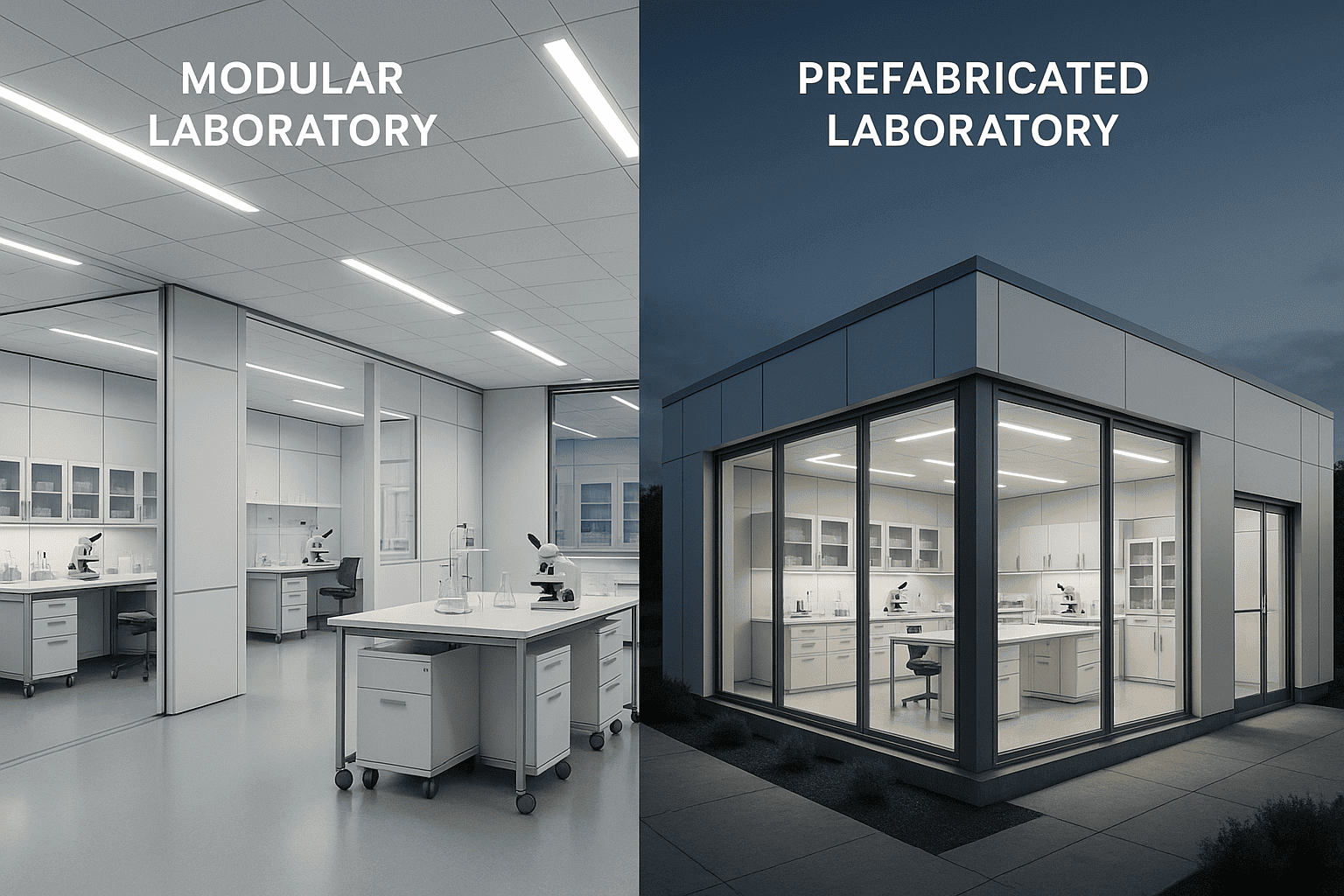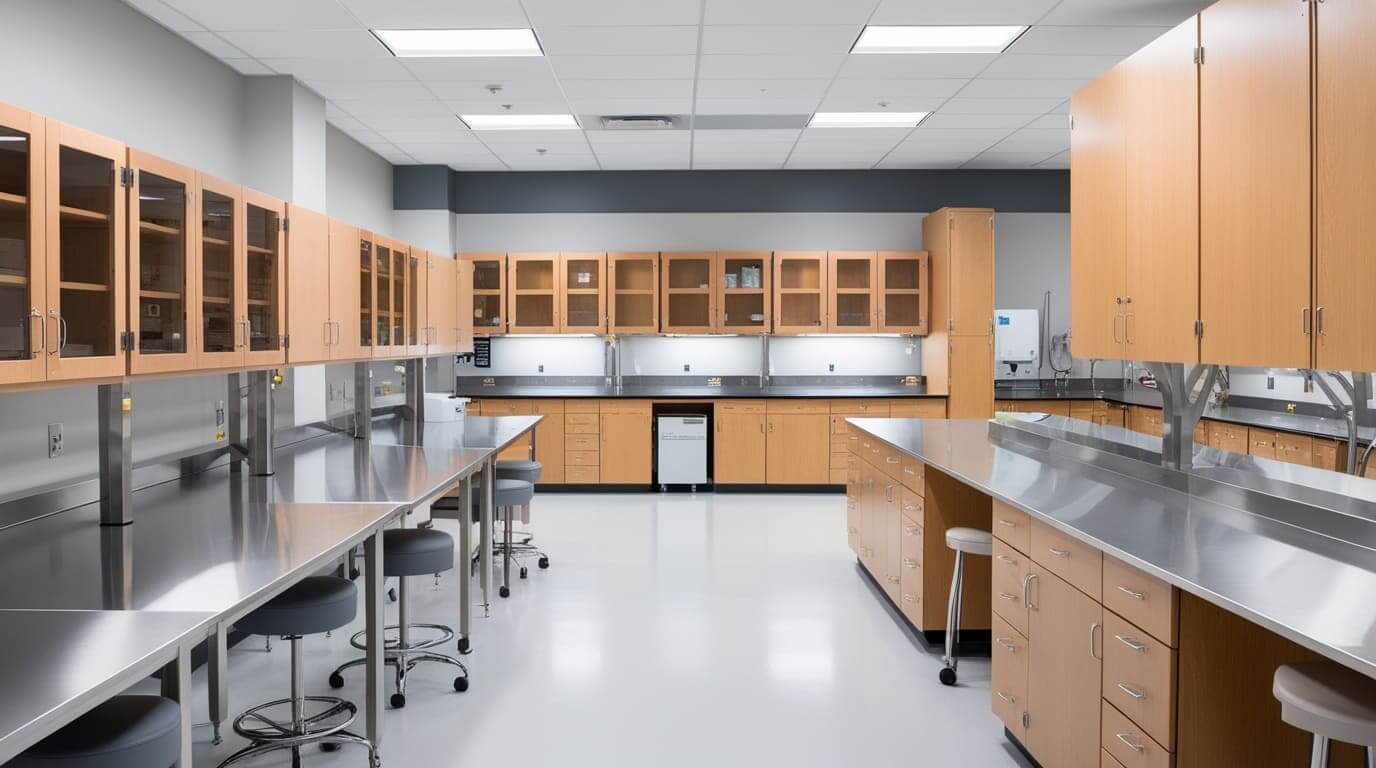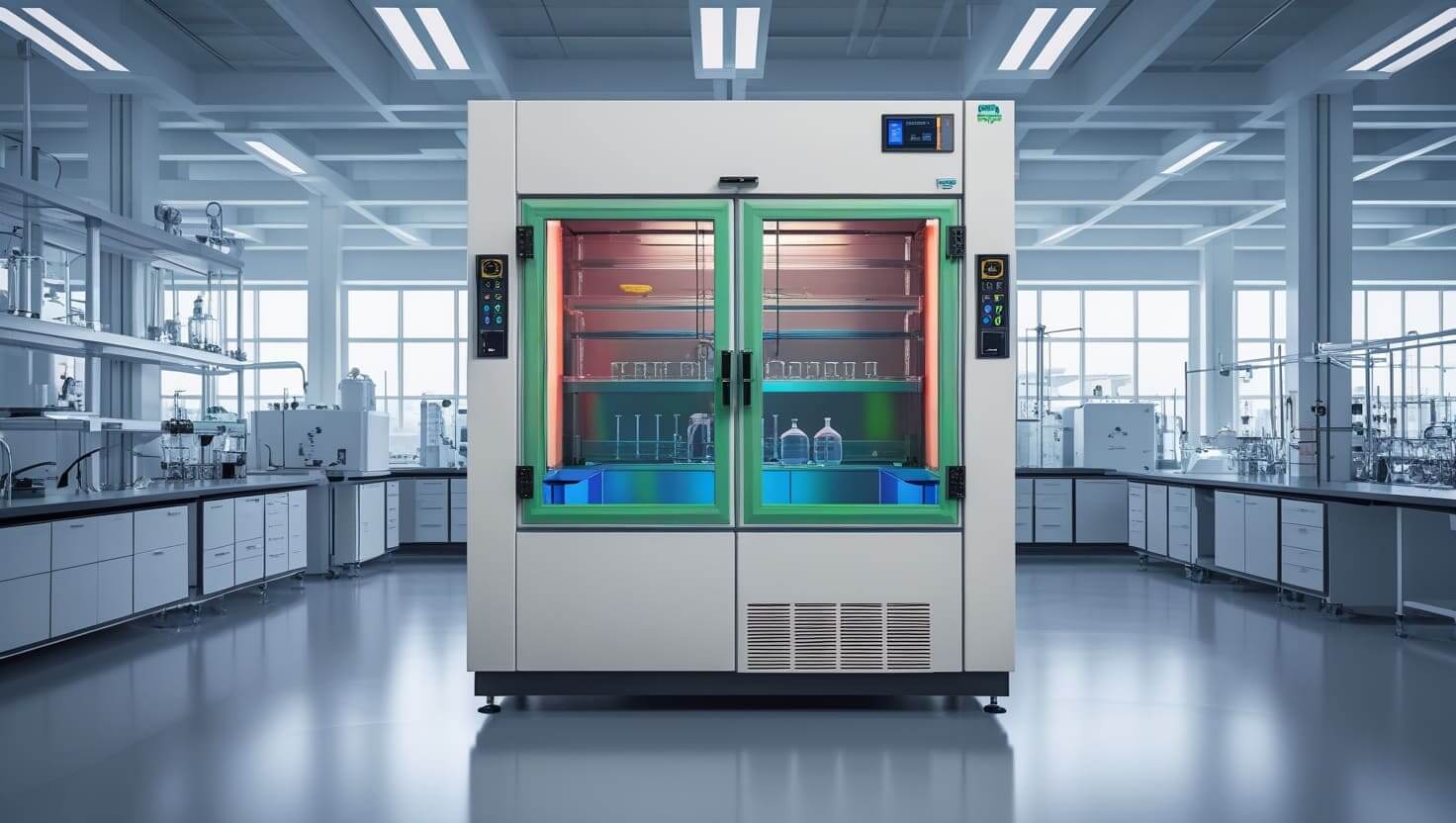When it comes to setting up a laboratory, choosing between Modular Laboratories and Prefabricated Laboratories can be a challenging decision. Both options offer speed, flexibility, and efficiency — but they differ in design, cost, installation process, and long-term adaptability. Understanding these differences can help you select the best option for your project, whether it’s a research facility, educational lab, or industrial testing center.
In this article, we’ll explore the pros and cons of each type, compare costs and timelines, and discuss which might be the ideal choice for your specific needs.
What Are Modular Laboratories?
Modular Laboratories are built using pre-engineered sections or “modules” that can be assembled and customized to create a complete laboratory setup. These modules are constructed off-site and then transported to the project location for quick installation.
A leading Modular Laboratories Manufacturer can design these units according to your exact requirements — from laboratory furniture and HVAC systems to fume hoods, safety features, and cleanroom specifications.
The key advantage is flexibility: modular labs can be reconfigured, expanded, or relocated with minimal disruption. They are ideal for organizations that anticipate growth, need temporary setups, or operate in areas with limited construction access.
What Are Prefabricated Laboratories?
Prefabricated Laboratories are also built off-site, but unlike modular labs, they are usually designed as complete, standalone structures. Prefabrication involves constructing the entire lab building in a controlled factory environment, then delivering it to the site for installation.
This approach reduces on-site labor and environmental impact while ensuring high-quality construction. Prefabricated labs are often used for permanent installations where speed and precision are priorities.
While modular labs focus on flexibility, prefabricated labs prioritize durability and turnkey completion.
Comparison: Modular vs Prefabricated Laboratories
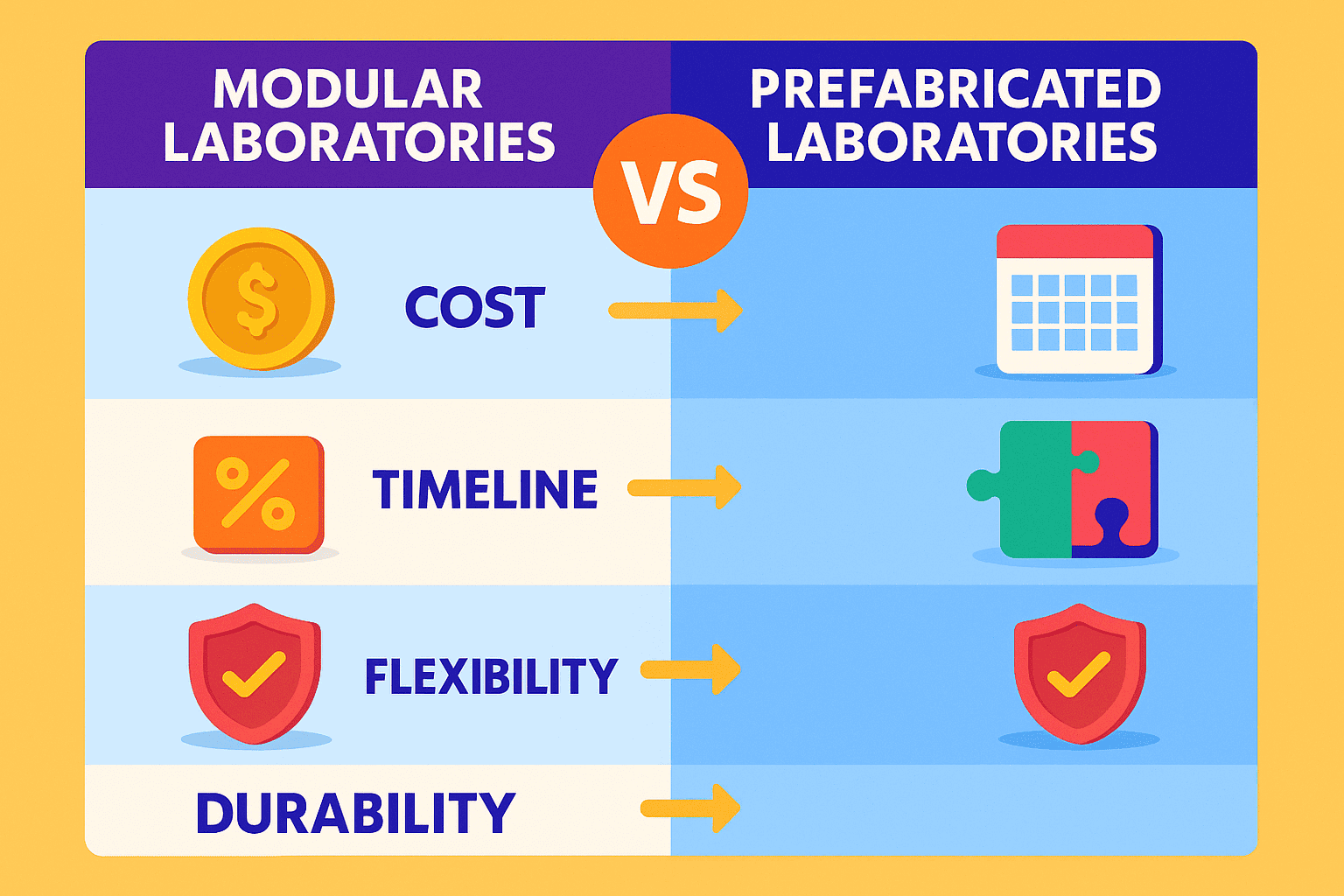
Let’s compare both options across key factors — cost, construction time, flexibility, and use cases.
1- Cost
- Modular Laboratories:
Generally, modular labs are more cost-effective due to efficient manufacturing processes and reduced on-site labor. You can save up to 20–30% compared to traditional construction.
Additionally, maintenance and future expansion costs are lower since individual modules can be replaced or upgraded easily. - Prefabricated Laboratories:
Prefabricated labs may have a slightly higher upfront cost because they’re built as complete units. However, their durability and low maintenance needs make them cost-efficient in the long run.
Verdict: If your budget is tight or you need scalability, modular is the smarter choice. For long-term, permanent setups, prefabricated labs may justify their higher initial investment.
2- Timeline
- Modular Laboratories:
These labs can be constructed and installed within a few weeks to months, depending on project size. Because most of the work happens off-site, site preparation and module manufacturing occur simultaneously, significantly reducing project timelines. - Prefabricated Laboratories:
Prefabricated labs also offer fast installation but require more factory time for complete unit assembly. The transportation and setup process can take longer compared to modular installations.
Verdict: Modular labs have a slight edge in time efficiency, especially when you need quick deployment.
3- Flexibility and Customization
- Modular Laboratories:
Flexibility is where modular systems truly shine. You can easily reconfigure the layout, add more units, or move the lab to a new location. This makes them ideal for industries that require frequent changes in technology or workflow. - Prefabricated Laboratories:
Prefabricated structures are less adaptable once installed. Customization is possible during design, but modifications afterward can be costly and time-consuming.
Verdict: For adaptability and scalability, modular wins hands down.
4- Durability and Lifespan
- Modular Laboratories:
Built to be relocatable, modular labs use durable materials but may not have the same structural longevity as fully prefabricated buildings. They are, however, highly reliable for both temporary and semi-permanent use. - Prefabricated Laboratories:
These are designed for permanent use, with robust materials and high-quality finishes that can last for decades with proper maintenance.
Verdict: Prefabricated labs offer better long-term durability, while modular labs are more practical for short- to medium-term needs.
5- Use Cases
- Modular Laboratories:
Perfect for research organizations, universities, and companies that require rapid deployment or temporary setups. Common use cases include mobile testing units, biotech research, educational science labs, and cleanrooms. - Prefabricated Laboratories:
Best suited for pharmaceutical plants, hospitals, government research centers, and large industrial facilities that require a permanent, high-performance laboratory setup.
Verdict: Choose modular for flexibility and speed, prefabricated for permanence and scale.
Pros and Cons Overview
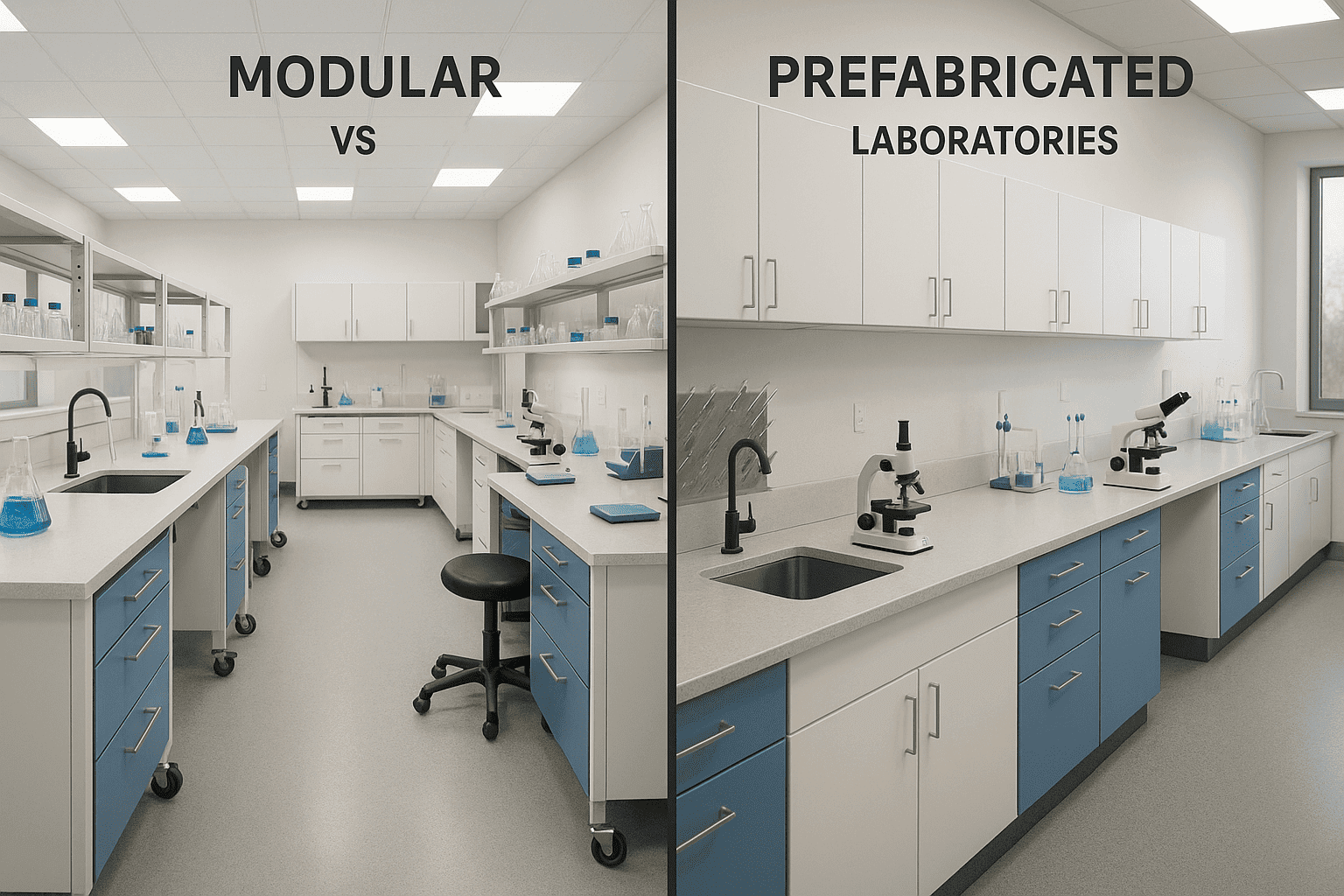
| Aspect | Modular Laboratories | Prefabricated Laboratories |
| Cost | Lower upfront, scalable | Higher upfront, durable |
| Installation Time | Faster setup | Slightly longer setup |
| Flexibility | Highly customizable, relocatable | Limited post-install changes |
| Durability | Good for medium-term use | Excellent for long-term use |
| Use Cases | Research, education, mobile labs | Permanent industrial labs |
| Scalability | Easy to expand | Requires more planning |
Which One Should You Choose?
The choice between Modular Laboratories and Prefabricated Laboratories depends on your project goals, budget, and long-term needs.
- If you value speed, flexibility, and scalability, modular labs are your best bet. They allow quick setup, easy relocation, and cost savings over time.
- If you prioritize permanence, durability, and turnkey completion, prefabricated labs are the superior option. They provide long-lasting infrastructure with minimal maintenance.
Partnering with an experienced Modular Laboratories Manufacturer ensures that your design, materials, and systems meet all regulatory and performance standards. Whether you need a compact modular setup or a fully prefabricated facility, expert manufacturers can customize solutions for your workflow, safety, and compliance requirements.
Final Thoughts
Modern laboratory construction is evolving rapidly, and both Modular Laboratories and Prefabricated Laboratories represent the future of efficient, high-quality lab setups.
Modular labs provide unmatched versatility — ideal for organizations that anticipate change and growth. Prefabricated labs, on the other hand, deliver stability and long-term reliability for large-scale or permanent research environments.
Ultimately, the “best” option depends on your specific goals:
- Need speed and adaptability? Choose modular.
- Need strength and permanence? Choose prefabricated.
By working with a trusted Modular Laboratories Manufacturer, you can get the perfect balance between innovation, efficiency, and performance — ensuring your lab is ready for today’s needs and tomorrow’s challenges.

